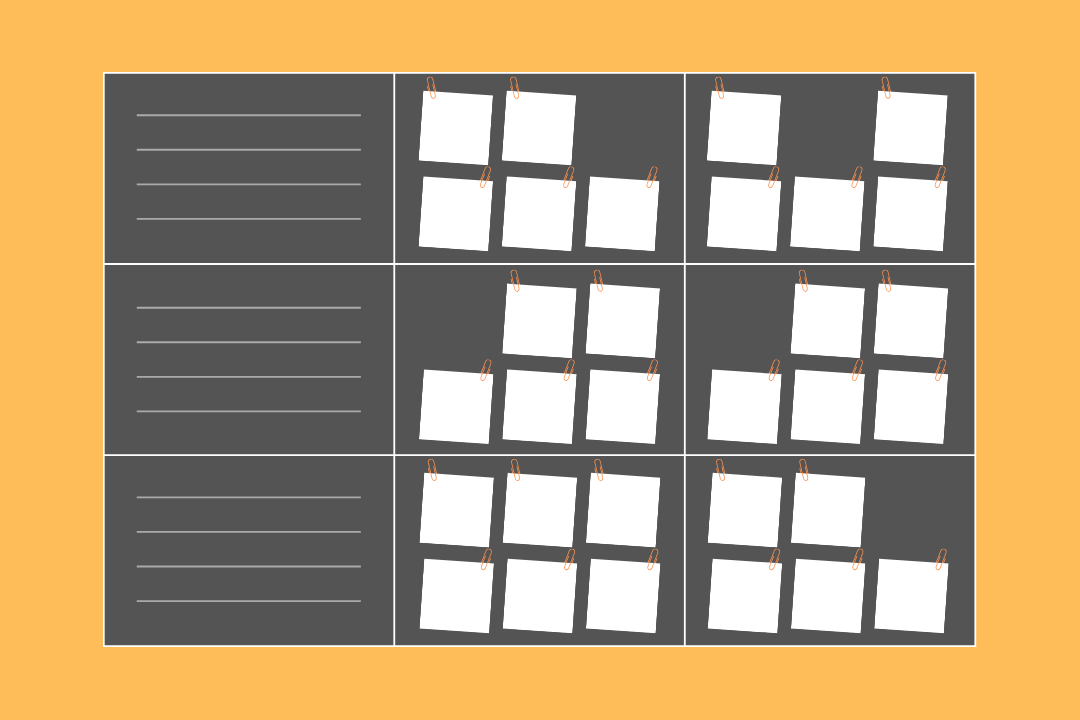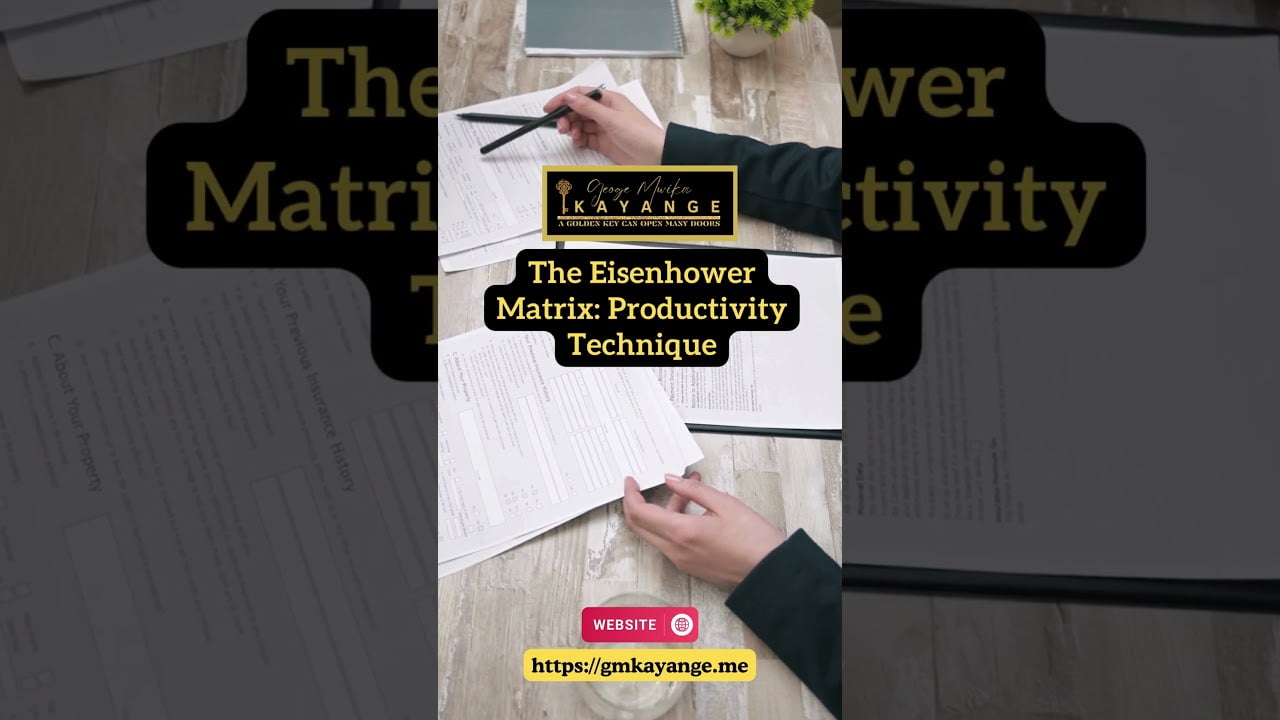
So, you want to master the Eisenhower matrix for ultimate productivity? In this YouTube video, I show you how to prioritise your tasks like a pro and achieve maximum efficiency in your daily life.
Forget the days of aimlessly wandering around, unsure of what to tackle first. With the Eisenhower Matrix, you’ll discover the secret behind how successful individuals and business leaders manage their time and stay organised.
So, what are you waiting for? In this article, I explain how to use the matrix to categorise tasks into four quadrants, prioritise based on importance and urgency, proactively tackle essential tasks, and avoid those pesky, unimportant ones.
I also give some bonus tips on regularly reassessing and adjusting your priorities for even better time management.
And if that’s not enough, I have curated a list of reading recommendations to inspire you, including gems like “The 7 Habits of Highly Effective People” and “How to Be a Productivity Ninja.” So don’t delay; get ready to become a productivity master and say goodbye to those unproductive days!
The Eisenhower Matrix: Categorising tasks into four quadrants
The Eisenhower Matrix is a game-changing method that constantly motivates me as someone who aspires to be effective and productive. This matrix, named after former U.S. President Dwight D. Eisenhower, helps individuals categorise their tasks into four distinct quadrants, prioritising and tackling their workload efficiently.
Prioritising tasks based on importance and urgency in the Eisenhower Matrix
The beauty of the Eisenhower Matrix lies in its ability to help us differentiate between essential tasks and those that are urgent. By classifying our tasks into these two categories, we can better understand how to allocate our time and energy.
Eisenhower Matrix Quadrant 1: Important and Urgent tasks
In this quadrant, we find tasks that demand immediate attention and have significant consequences if not addressed promptly. These can include critical deadlines, urgent work assignments, or unexpected issues that require prompt resolution. We must tackle these tasks first and give them our utmost attention.
Eisenhower Matrix Quadrant 2: Important but not Urgent tasks
The tasks in this quadrant are the ones we often overlook or procrastinate on, but they hold great significance in the long run. This includes personal development, goal-setting, strategizing, and building relationships. Though they may not have imminent deadlines, investing time and effort in these tasks will yield long-term benefits.

This image is the property of i.ytimg.com.
Eisenhower Matrix Quadrant 3: Urgent but not Important Tasks
Quadrant 3 is a tricky area that often entices us with its apparent urgency. However, we must avoid prioritising these tasks over more important ones. They may include interruptions, distractions, or requests from others that do not align with our goals or contribute significantly to our overall productivity. While some urgent but unimportant tasks may need attention, we should aim to minimise their impact on our day-to-day activities.
Eisenhower Matrix Quadrant 4: Not Urgent and Not Important Tasks
Ah, quadrant 4, the land of distractions and time-wasting activities. These tasks offer little value and should be avoided as much as possible. They can include excessive social media use, mindless browsing, or other unproductive behaviour. By identifying and consciously minimising the time we spend on quadrant four tasks, we can reclaim valuable time for more important pursuits.
Tackling essential but not urgent tasks proactively in the Eisenhower Matrix
One of the most powerful aspects of the Eisenhower Matrix is its ability to guide us towards being more proactive and intentional with our time. By focusing on important but not urgent tasks, we can make significant progress in our personal and professional lives.
Let’s delve into some tips on how to tackle these tasks proactively:

1. Set aside dedicated time for Quadrant 2 tasks
Make it a habit to carve out specific blocks of time in your schedule for necessary, but not urgent, tasks. This could mean dedicating an hour every morning to self-improvement activities, such as reading, learning, or goal-setting.
By scheduling these tasks, you prioritise them and ensure they receive the attention they deserve.
2. Break down big projects into manageable chunks
If you have a substantial task or project that falls into quadrant 2, it can be intimidating to tackle all at once.
Instead, break it down into smaller, more manageable tasks. This will make it less overwhelming and allow you to make progress incrementally, increasing your motivation and momentum.
3. Use the Pomodoro Technique for focused work
The Pomodoro Technique is a time management method that encourages focused work in short bursts. Set a timer for 25 minutes and work solely on your quadrant 2 tasks during this time. Once the timer goes off, take a short break before starting another Pomodoro session. This technique helps maintain concentration and prevent burnout.
4. Eliminate distractions
When working on important but not urgent tasks, it is crucial to minimise distractions to maximise productivity.
Put your phone on silent or in another room, close unnecessary tabs on your computer, and create a quiet and clutter-free workspace. By reducing external disruptions, you can fully immerse yourself in the task.
Avoiding unimportant and non-urgent tasks in the Eisenhower Matrix
While focusing on important tasks is essential for productivity, avoiding getting caught up in unimportant and non-urgent activities is equally important. Here are some strategies to help you steer clear of these distractions:
1. Learn to say “no”
Often, we feel obliged to take on tasks or requests out of a sense of obligation or fear of disappointing others. However, it is crucial to recognise our limits and learn to say “no” when a task does not align with our priorities. Protect your time and energy for tasks that truly matter.
2. Delegate or outsource tasks when appropriate
If you are overwhelmed with non-essential tasks, consider delegating or outsourcing them. This could mean asking a colleague for help, hiring a virtual assistant, or utilising online platforms that offer specialised services. By offloading these tasks, you free up valuable time for more important endeavours.
3. Embrace the power of time-blocking in the Eisenhower Matrix
Time-blocking involves assigning specific time slots in your schedule to different tasks.
By allocating dedicated blocks of time to important and meaningful activities, you reduce the chances of getting sidetracked by non-essential tasks.
Please stick to your time blocks as much as possible and guard them fiercely.
4. Practice mindful use of technology
While technology can be a valuable tool for productivity, it can also be a significant source of distraction. Be aware of your usage patterns and set boundaries for yourself.
Consider using productivity apps or browser extensions that limit access to certain websites or track your time on different tasks.
Regularly reassessing and adjusting task priorities in the Eisenhower Matrix
In our fast-paced world, priorities can shift rapidly, and new tasks can emerge unexpectedly. To stay on top of your productivity game, it is essential to reassess and adjust your task priorities regularly.
Here are a few tips to help you adapt to changing circumstances:
1. Set aside time for weekly or monthly reviews
Schedule dedicated time in your calendar to reflect on your progress and reassess your task priorities. This could be a weekly or monthly practice where you evaluate what tasks are still relevant, what needs to be reprioritized, and what can be deferred or eliminated. This intentional reflection ensures you stay aligned with your goals and adapt to changing circumstances.
2. Embrace flexibility and adaptability
Life is full of unexpected twists and turns, and tasks that were once important and urgent might become less relevant over time. It’s crucial to recognise when priorities shift and be willing to adapt. Embrace flexibility in your approach and be open to adjusting your plans when necessary.
3. Seek feedback and input from others
Sometimes, gaining an outside perspective can provide valuable insights and help you make more informed decisions about task priorities. Contact mentors, colleagues, or trusted friends for their input and advice. Collaborative discussions can shed light on blind spots and offer alternative viewpoints that you may not have considered.
4. Remember that priorities can change
It’s important to acknowledge that priorities can change, and that’s okay. Your goals and aspirations may shift as you grow and evolve personally and professionally. Embrace these changes and use them as opportunities to reevaluate and redefine your task priorities accordingly.
Conclusion
In conclusion, the Eisenhower Matrix is a powerful tool for categorising and prioritising tasks efficiently. By understanding the importance and urgency of each task, we can make informed decisions on where to focus our energy.
Proactively tackling essential but not urgent tasks while avoiding unimportant and non-urgent tasks allows us to make progress towards our goals and increase overall productivity.
Regularly reassessing and adjusting task priorities ensures we stay aligned with our goals and adapt to changing circumstances.
By incorporating the Eisenhower Matrix into our daily lives and following the tips provided, we can achieve better time management and unlock our full potential.
Remember, it’s more than just a matrix; it’s a mindset and a way of approaching productivity. So, embrace the power of the Eisenhower Matrix, take control of your productivity, and unlock your true potential in your personal and professional endeavours.
To achieve ultimate productivity, I have mastered the Eisenhower Matrix. It has taught me how to effectively prioritise tasks and ensure maximum efficiency in my daily life.
By understanding how successful individuals and business leaders manage their time and stay organised, I can take control of my productivity. Subscribe now to unlock the power of the Eisenhower Matrix, and join me on this journey!
In this video, I have outlined the key points that will help you master the Eisenhower Matrix:
- Categorise tasks into four quadrants using the Eisenhower Matrix.
- Prioritise tasks based on their importance and urgency.
- Proactively tackle tasks that are important but not urgent.
- Avoid tasks that are unimportant and non-urgent.
- Regularly reassess and adjust your task priorities.
- Achieve better time management and productivity with this simple technique.
Recommended Books for Further Inspiration
As someone who appreciates the power of books as a source of knowledge and inspiration, I have compiled a list of recommended reads that delve deeper into productivity, time management, and personal growth. These books offer valuable insights and practical strategies to help you enhance your efficiency and master the Eisenhower Matrix:
- “The 7 Habits of Highly Effective People: Powerful Lessons in Personal Change” by Stephen Covey. Purchase Link
- “Deep Work: Rules for Focused Success in a Distracted World” by Cal Newport. Purchase Link
- “Getting Things Done: The Art of Stress-Free Productivity” by David Allen. Purchase Link
- “Essentialism: The Disciplined Pursuit of Less” by Greg McKeown. Purchase Link
- “How to be a Productivity Ninja: Worry Less, Achieve More and Love What You Do” by Graham Allcott. Purchase Link
- “Scrum: The Art of Doing Twice the Work in Half the Time” by Jeff Sutherland. Purchase Link
These books are valuable resources for anyone seeking to enhance their productivity, time management skills, and overall personal effectiveness. Whether you read them or listen to them in audiobook format, they offer valuable insights and practical strategies to support your journey towards ultimate productivity.
AFFILIATE DISCLOSURE:
This article contains affiliate links. I’ll receive a small commission if you click on one of the product links. However, knowing that the affiliate relationship does not influence my opinion is essential. I would never endorse programmes, products, or services I haven’t used or feel familiar with. Using my links to support me enables me to continue contributing more to this productivity topic. I sincerely thank you for your support.
George Mwika Kayange is an International Development Professional and Project Management Specialist with over 20 years of experience working with various national, regional, and international NGOs. He is also a Commonwealth PhD Scholar at Loughborough University, London.
